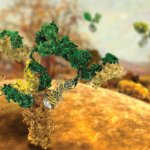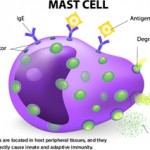A recently published study shows that inflammatory disease begins well before synovitis is seen on exam; a better understanding of what’s brewing before the storm could lead to the development of preventive therapies for RA.


A recently published study shows that inflammatory disease begins well before synovitis is seen on exam; a better understanding of what’s brewing before the storm could lead to the development of preventive therapies for RA.

Research has found blood tests detect elevations of autoantibody isotypes in patients years before they are diagnosed with rheumatoid arthritis (RA). According to Kevin Deane, MD, PhD, identifying patients during this pre-RA period may be key to preventing or delaying the onset of RA.

ATLANTA—A key goal for rheumatology researchers and clinicians is to predict through specific biomarkers if someone will, at some point in their future, develop rheumatoid arthritis (RA). If so, the disease could be prevented or stopped before the inflammation and ravaging begins, explained researchers during a Basic Science lecture at the 2019 ACR/ARP Annual Meeting…

Anti-citrullinated protein antibodies (ACPAs) are now viewed as critical diagnostic and prognostic markers for rheumatoid arthritis (RA). Research into the pathophysiology of these autoantibodies has proven to be a ripe area of investigation, opening up many promising avenues for better understanding the etiology and pathogenesis of RA. Ultimately, work utilizing these autoantibodies may also allow…

Catherine Kolonko |
Researchers say a study of individual antibody response to citrullinated and non-citrullinated proteins in sputum samples further supports the importance of the lung in early development of rheumatoid arthritis-related autoimmunity. Investigation of the fundamental mechanism that leads to antibody responses in rheumatoid arthritis is key to uncovering ways to predict and prevent the development of…
Reuters Staff |
NEW YORK (Reuters Health)—Anti-citrullinated protein antibodies (ACPA), particularly high anti-CCP2 titers, can diagnose rheumatoid arthritis (RA) in the general population with a high degree of accuracy, a Swedish study suggests. ACPA are highly specific for RA, but until now the diagnostic accuracy of ACPA in the general population has not been “thoroughly assessed,” note Dr….

SAN FRANCISCO—What factors help determine whether or not inflammation resolves, leading to healing, or becomes chronic, leading to disease and tissue destruction? A number of important cells, including toll-like receptors, mast cells, anti-citrullinated protein antibodies, complement and interferon, all play their own role in this process. By understanding how they act in innate and adaptive…

A new study from Stockholm, Sweden, strengthens the link between the lungs and anti-citrullinated protein antibody (ACPA)–positive RA. After analyzing the bronchial tissue of untreated patients with early RA, researchers found the patients’ lungs had signs of immune cell accumulation and activation…
Megan Brooks |
NEW YORK (Reuters Health)—For rheumatoid arthritis (RA) patients in stable remission, a panel of inflammatory markers in blood can help predict the odds of relapse when disease-modifying anti-rheumatic drug (DMARD) therapy is tapered, say researchers from Germany. The multibiomarker disease activity (MBDA) score, when combined with anticitrullinated protein antibody (ACPA) testing, can predict relapse in…
Reuters Staff |
NEW YORK (Reuters Health)—Patients with untreated early rheumatoid arthritis (RA) show signs of immune activation and local inflammation in their bronchial tissues, researchers from Sweden report. Previous studies have shown that patients with RA have shared citrullinated epitopes in the lungs and joints, as well as anticitrullinated protein antibodies (ACPA) in bronchoalveolar lavage (BAL), suggesting…